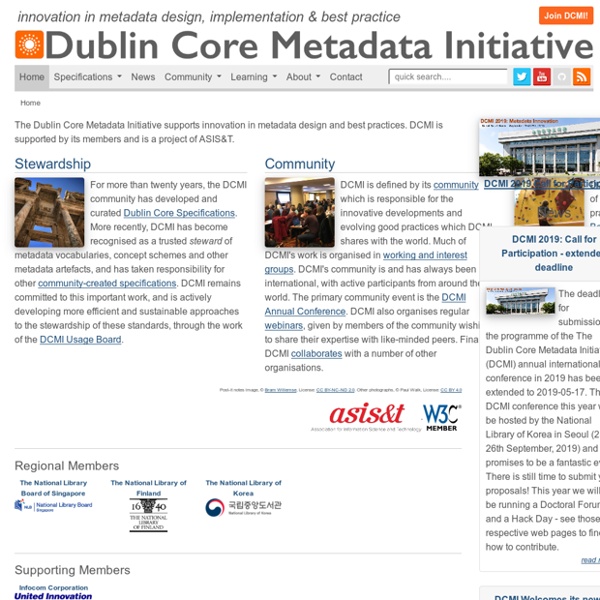



Finding Sources with The Full Wiki A few weeks ago, I came across articles at LifeHacker and Hack College mentioning a web service called The Full Wiki. I was intrigued. I often tell my students that Wikipedia isn’t a source that they should ordinarily use directly in their work, but that it can be a good place to get a quick overview of a topic. They may also find it helpful to look at the references an article cites. The Full Wiki seeks to make Wikipedia more useful for students.
Renaming files Good digital asset management strategy starts with unique, meaningful file names. For creative professionals who can easily produce very large volumes of media in a relatively short period of time, this is especially important. When an image collection grows past a thousand files, it is easy to have file name problems, such as having two images with the same file name. Most digital cameras have a sequential photo-numbering option. Dublin Core Logo image of DCMI, which formulates Dublin Core The Dublin Core Schema is a small set of vocabulary terms that can be used to describe digital resources (video, images, web pages, etc.), as well as physical resources such as books or CDs, and objects like artworks.[1] The full set of Dublin Core metadata terms can be found on the Dublin Core Metadata Initiative (DCMI) website.[2] The original set of 15 classic[3] metadata terms, known as the Dublin Core Metadata Element Set (DCMES),[4] is endorsed in the following standards documents: IETF RFC 5013[5]ISO Standard 15836-1:2017[6]NISO Standard Z39.85[7] Dublin Core metadata may be used for multiple purposes, from simple resource description to combining metadata vocabularies of different metadata standards, to providing interoperability for metadata vocabularies in the linked data cloud and Semantic Web implementations. Background[edit] Levels of the standard[edit]
The LibriVox Free Audiobook Collection : Free Audio : Download & Streaming : Internet Archive Librivox recording of Alice's Adventures in Wonderland, by Lewis Carroll. A children's classic! Read by: Chapter 01 Kristen McQuillin Chapter 02 Brad Bush Chapter 03 Roger W. What is Linked Data? I suspect many of our readers may already have a black belt in Linked Data, but for others it’s all new, so I thought it was worth explaining what Linked Data means to me. The definitive description is Tim Berners-Lee’s Design Issues document, but I’ll try to illustrate what this means in practice. In a nutshell, Linked Data is: “a method of publishing structured data [on the Web], so that it can be interlinked and become more useful.” -wikipedia
What You Don't Know About Copyright, but Should - Technology By Jennifer Howard If Nancy Sims had to pick one word to describe how researchers, students, and librarians feel about copyright, it would probably be "confused." A lawyer and a librarian, Ms. Sims is copyright-program librarian at the University of Minnesota Libraries. She's there to help people on campus and beyond—both users and owners of protected material—understand their rights. "I'm not sure anybody has a very good knowledge" of copyright, she says. filenaming_20080508_final.pdf (application/pdf Object) The Government Records and Digital Services sections are part of the Department of Cultural Resources, Division of Archives and Records. Their primary mission is to provide and administer records management services to state government agencies, local government agencies, and state-supported institutions of higher education in North Carolina in accordance with General Statutes 121 and 132 and the mandate provided in these laws for the preservation of the historical record of this state. Visit Us Contact information, mailing address, information about parking and public transit for visitors to the State Records Center. Note: In accordance with NC Administrative Code, entry and access to the SRC building is limited to persons on official business. Staff List
Guide To Subject Analysis These guidelines are intended to be used with member copy cataloging. DLC copy cataloging should continue to be accepted as is, unless you spot something really glaring. Remember, there are no hard and fast rules for assigning subject headings and call numbers. A lot of subject analysis relies on judgement calls. When in doubt or completely stumped, ask the appropriate subject cataloger. For the appropriate subject cataloger, see Who's Who in Cataloging?